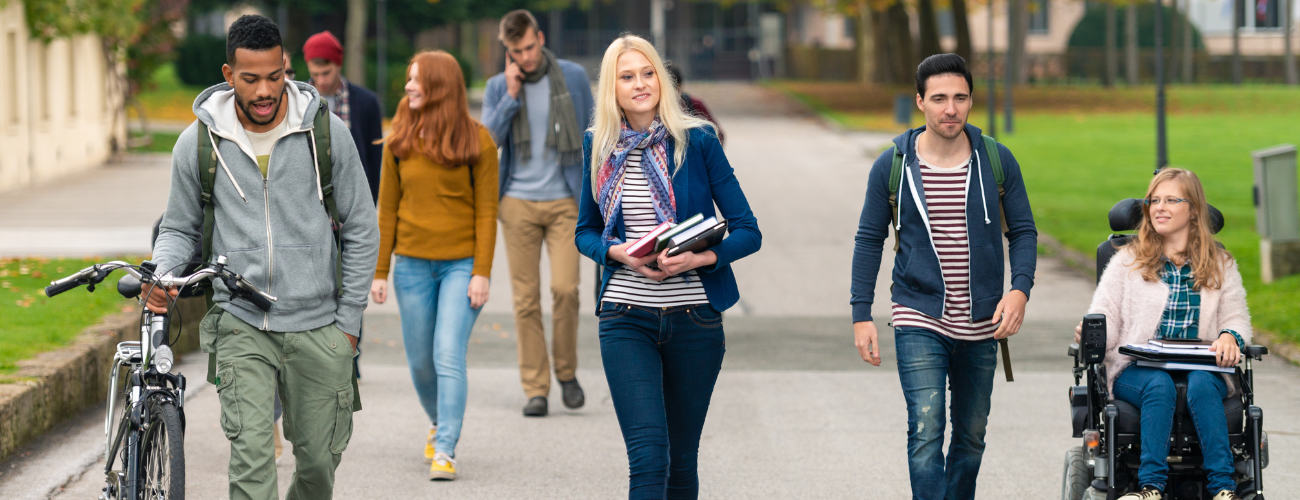
Project Overview
About The Project
Travel4Climate is a student-led action project that is more than just learning about climate change. During this project, students will learn about how transportation emits greenhouse gases in their communities and use an emissions calculator to make an innovative future-focused transportation proposal.
Travel4Climate is perfect for Grade 9 and 10 teachers teaching climate science, but connects well with various subjects from Grades 9-12.
Travel4Climate is also aligned with the United Nations Sustainable Development Goals. Particularly:
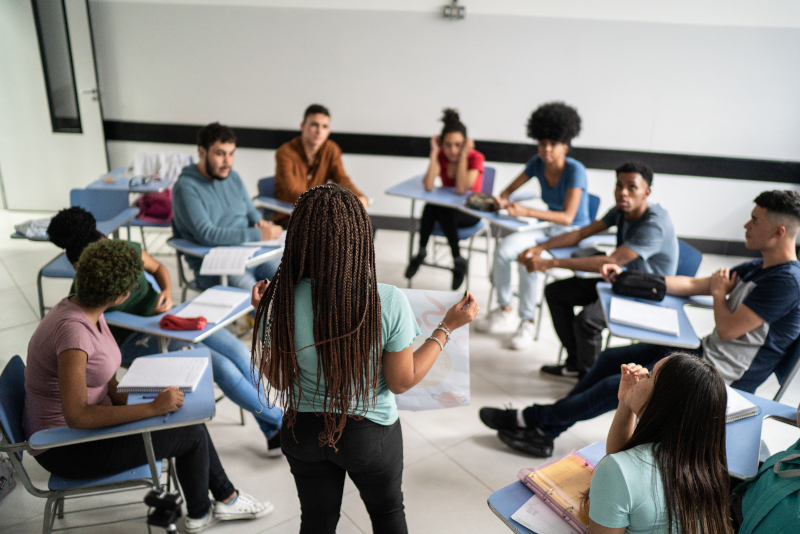
- Goal 7: Ensure access to affordable, reliable, sustainable and modern energy for all
- Goal 9: Build resilient infrastructure, promote inclusive and sustainable industrialization and foster innovation
- Goal 11: Make cities and human settlements inclusive, safe, resilient and sustainable
- Goal 13: Take urgent action to combat climate change and its impacts
Further connections can be made with the Global Competencies of: innovation, creativity, collaboration, entrepreneurship, global citizenship and sustainability.
Registering for the project is free!
During this experience, students will:
- Analyze their community’s current transportation situation to identify needs and opportunities.
- Use a carbon emissions calculator tool to explore the greenhouse gas emissions of various transportation types.
- Learn about emerging transportation technologies and their impact on the environment.
- Make well-informed decisions about future transit choices and supporting infrastructure in their communities.
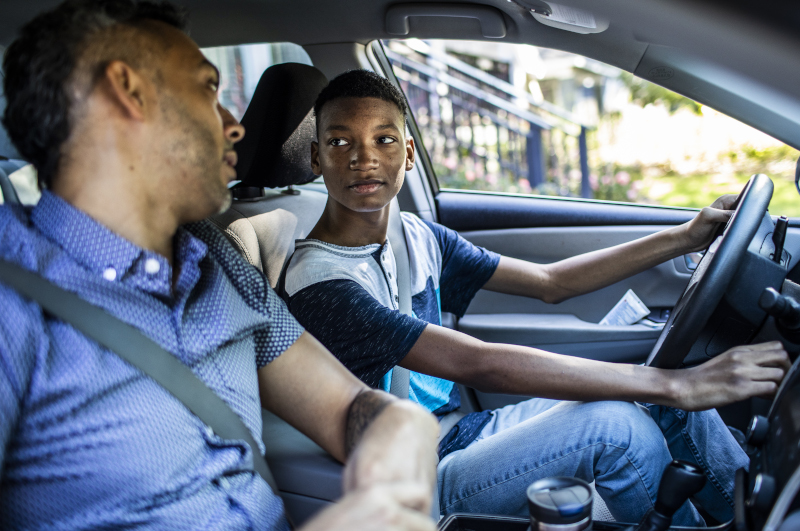
Resources
Travel4Climate allows educators to integrate climate change education seamlessly into the classroom with minimal prep and materials. This experience is easy to implement in every teaching environment for entire classes or as an independent project.
Teachers get:

- Access to extensive research-based information about emerging transportation technologies adapted to meet curriculum expectations
- Three lesson plans aligned to Climate science units and adaptable to urban and rural contexts
- A 10+ page Student Notebook that includes worksheets for all activities
- An Interactive Student Transportation Flowchart and learning activities
- Rubrics and assessment tools
- Access to the online Travel4Climate Emissions Calculator (available in English and French)
- A Career Exploration Section with related career profiles
- Printable/ Screen-reader copies of the transportation flowchart and student notebook for differentiation.
Connecting to the Curriculum
Travel4Climate is designed to be used as part of the Grade 10 Science, Climate Change unit. However, this project connects to various curriculum outcomes and is appropriate for use in Grades 9 through 12.
Read more about how this project connects to the curriculum on the Curriculum Connections page.
Lessons
Description
Students will learn how greenhouse gases are produced from a vehicle’s combustion engine and consider the existing transportation needs and opportunities of their community.
Overview
| Activities | Description |
|---|---|
| Minds-On: The future is what we make it! | Register for free to unlock content. |
| Action 1: How does a combustion engine work? | Register for free to unlock content. |
| Action 2: What are the needs and opportunities in our community? | Register for free to unlock content. |
| Consolidation: Here is where we are now. | Register for free to unlock content. |
Learning Goals
Students will:
- Be able to explain how an internal combustion engine works and how it produces greenhouse gases.
- Consider the transportation needs and opportunities in their community.
Success Criteria
Students can:
- Demonstrate their understanding of the four operational stages of an internal combustion engine Demonstrate their understanding of reactants and products in a complete combustion reaction
- Successfully articulate their current transportation needs and opportunities
Here is a sneak peek at the student notebook that accompanies the lessons!
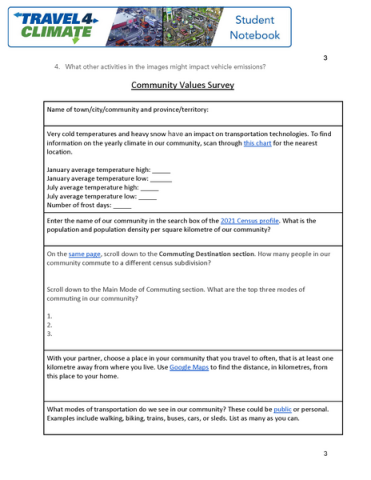
Lesson 1: Travel and Greenhouse Gases
Description
Students will learn how greenhouse gases are produced from a vehicle’s combustion engine and consider the existing transportation needs and opportunities of their community.
Overview
| Activities | Description |
|---|---|
| Minds-On: The future is what we make it! | Register for free to unlock content. |
| Action 1: How does a combustion engine work? | Register for free to unlock content. |
| Action 2: What are the needs and opportunities in our community? | Register for free to unlock content. |
| Consolidation: Here is where we are now. | Register for free to unlock content. |
Learning Goals
Students will:
- Be able to explain how an internal combustion engine works and how it produces greenhouse gases.
- Consider the transportation needs and opportunities in their community.
Success Criteria
Students can:
- Demonstrate their understanding of the four operational stages of an internal combustion engine Demonstrate their understanding of reactants and products in a complete combustion reaction
- Successfully articulate their current transportation needs and opportunities
Here is a sneak peek at the student notebook that accompanies the lessons!

Lesson 2: Emerging Transportation Technologies
Lesson 3: The Future of Transportation
Description
Students will learn how greenhouse gases are produced from a vehicle’s combustion engine and consider the existing transportation needs and opportunities of their community.
Overview
| Activities | Description |
|---|---|
| Minds-On: The future is what we make it! | Register for free to unlock content. |
| Action 1: How does a combustion engine work? | Register for free to unlock content. |
| Action 2: What are the needs and opportunities in our community? | Register for free to unlock content. |
| Consolidation: Here is where we are now. | Register for free to unlock content. |
Learning Goals
Students will:
- Be able to explain how an internal combustion engine works and how it produces greenhouse gases.
- Consider the transportation needs and opportunities in their community.
Success Criteria
Students can:
- Demonstrate their understanding of the four operational stages of an internal combustion engine Demonstrate their understanding of reactants and products in a complete combustion reaction
- Successfully articulate their current transportation needs and opportunities
Here is a sneak peek at the student notebook that accompanies the lessons!

Lesson 1: Travel and Greenhouse Gases
Description
Students will learn how greenhouse gases are produced from a vehicle’s combustion engine and consider the existing transportation needs and opportunities of their community.
Overview
| Activities | Description |
|---|---|
| Minds-On: The future is what we make it! | Register for free to unlock content. |
| Action 1: How does a combustion engine work? | Register for free to unlock content. |
| Action 2: What are the needs and opportunities in our community? | Register for free to unlock content. |
| Consolidation: Here is where we are now. | Register for free to unlock content. |
Learning Goals
Students will:
- Be able to explain how an internal combustion engine works and how it produces greenhouse gases.
- Consider the transportation needs and opportunities in their community.
Success Criteria
Students can:
- Demonstrate their understanding of the four operational stages of an internal combustion engine Demonstrate their understanding of reactants and products in a complete combustion reaction
- Successfully articulate their current transportation needs and opportunities
Here is a sneak peek at the student notebook that accompanies the lessons!

Lesson 2: Emerging Transportation Technologies
Lesson 3: The Future of Transportation
Start the Travel4Climate journey by registering for free to participate in Travel4Climate
Register NowLet’s Talk Science would like to acknowledge Dr. Meghan Winters for her contribution to the Travel4Climate project. She lends us her expertise as a professor in the Faculty of Health Sciences at Simon Fraser University. Dr. Winters provided equity and inclusion insights for the Community Values Survey in this lesson. Her teaching interests include epidemiology, GIS applications, built environment & health, transportation and city design.
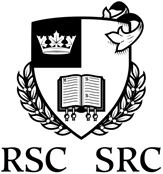
About the Royal Society of Canada
The Royal Society of Canada is a member driven organization that recognizes Canada's leading intellectuals, scholars, researchers and artists in order to help them build a better future in Canada and around the world. Let's Talk Science and the Royal Society of Canada partner to provide relevant content and programs about issues that affect us all - from education to the impact of leading-edge scientific discoveries.